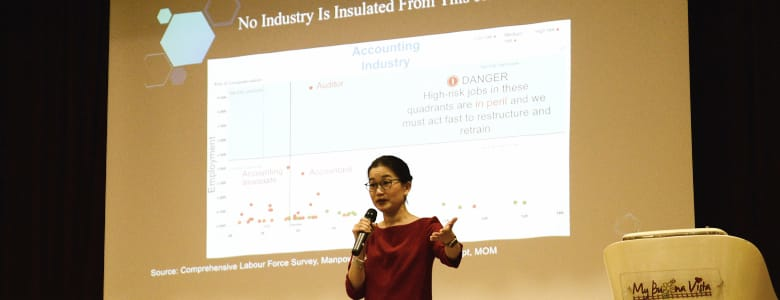Brave New Digital World

We are now on the cusp of what many are calling the Fourth Industrial Revolution.
Technologies such as robotics, artificial intelligence and the Internet of Things (IoT) are increasingly blurring the boundaries between the digital and physical worlds.
With machines increasingly able to make decisions on their own and to perform more than just mechanical grunt work, this new era will have a profound impact on human livelihoods, said GovTech Chief Executive Jacqueline Poh.
“Disruption in this era will be relentless,” she said. “The digital economy is pervasive, and the distinction between the old and new economy is fading very fast.”
Ms Poh was speaking on 20 April 2017 at a session titled Digital Transformation — Disruption, Challenges, Opportunities, held as part of the Buona Vista Community Club’s Industry Guru Series.
First organised in 2012, the Industry Guru Series brings together thought leaders and entrepreneurs from diverse industries to share their experiences with the public.
Future of jobs in the digital economy
Given that today, we can easily consult robo-insurance agents, robo-investment advisors and even robo-lawyers, it’s natural to worry about jobs being taken over by artificial intelligence.
“How susceptible your job is to automation depends on the degree to which you are performing a predictable activity versus an unpredictable one,” Ms Poh told the audience, which comprised mainly professionals, managers, executives and technicians (PMETs).
“The digital revolution is going to affect you even if you are a white collar professional.”
To prepare for the changes that lie ahead, Ms Poh encouraged the audience to take advantage of government initiatives such as SkillsFuture to reskill for the digital economy.
“There are many jobs that will be created that never existed before, and there are ways to prepare yourself for these jobs of the future.”
Business owners should think carefully about how their industries could potentially be disrupted by technology.
“Disruption might not take place in ways that you would automatically anticipate,” she said. The book publishing industry, for example, is being disrupted not so much by e-books, but by social media, which compels people to read short articles shared by their friends instead, she added.
“It’s important to rethink our mindset towards innovation,” she concluded. “There are a lot of opportunities that come with technological disruption, but we need to open our minds as to what those might be.”
Skills, skills, skills
The session also featured a panel discussion, comprising Ms Poh; Ms Carmen Yuen, senior executive director of investment management company Vertex Ventures; Ms Gina Heng, founder and CEO of private investment group Marvelstone Group; and Mr Lawrence Yong, CEO of MoolahSense, a Singapore-based peer-to-peer lending platform.
Ms Heng said that she had observed many former bankers and financiers moving to fintech startups.
“They identify problems and challenges in their work and think they can do a better job. They make use of what they worked on previously, using technology to help organisations innovate.”
Agreeing, Mr Yong said that PMETs, with their years of experience in their industries, had excellent domain knowledge that they could use to identify pain points within organisations, and thus create new business opportunities. “It’s important to have a growth mindset instead of a fixed mindset,” said Mr Yong.
“Even with new business models, first principles still remain. You just need to retool yourself with new skills to understand the technologies and platforms.”
Ms Yuen encouraged the audience to take the time to learn new skills, so that they could be prepared to make a career switch in the future.
“You could start by doing this as a hobby, you never know where it will lead. It’s better to be prepared than to be caught off guard,” she said.
Network of Trust
The session concluded with some thoughts from Mr Chan Chun Sing, Minister in the Prime Minister’s Office and Grassroots Adviser to Tanjong Pagar GRC Grassroots Organisations (Buona Vista).
“Most people forget that in the digital world, what wins is not the technology or the product, but the network,” he said, citing the example of the VHS cassette tape format, which out-competed Betamax not because it was the better technical standard, but because it had a better network.
“Whoever can win the public’s trust and make it self-perpetuating will win,” he added. “Thus, the truth is that there will be few winners and many losers in the technological revolution.”
Despite this, Mr Chan encouraged the audience to “stay alert but not afraid,” adding that there is a sense of excitement in Singapore about the possibilities of the digital economy.
“If we get this right, we’ll be able to transcend our geography and our finite resource limitations that have bound us for last 52 years. Data, if we master it well, will become the new oil or water,” he said.
“We have every chance of getting this right, but that’s provided we stay alert and don’t get complacent.”
https://www.tech.gov.sg/media/technews/brave-new-digital-world
